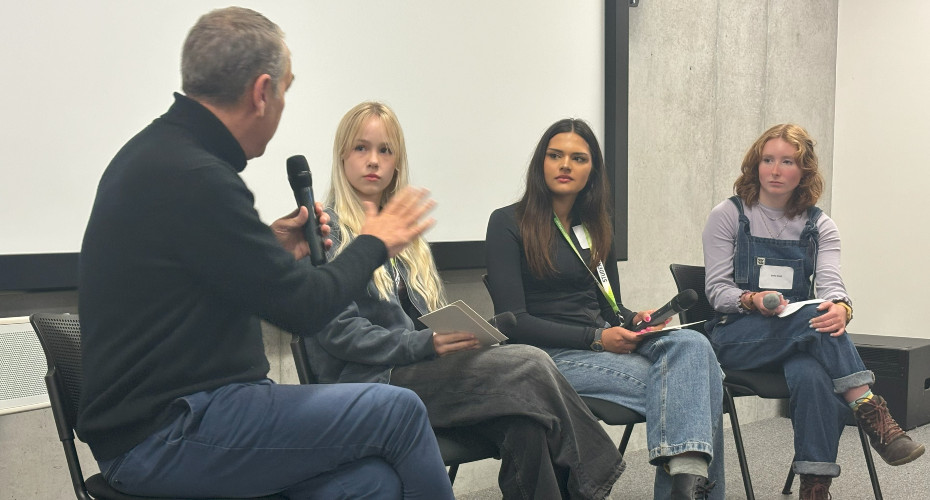Creative curricular reforms needed to improve opportunities for young people

Bella Dash, Jamie and Rosalia, interviewed Professor Lee Elliot Major at the event
Educators and industry leaders from across the South West have called for a more creative school curriculum that engages students and equips them with the skills needed for the rapidly evolving job market.
This year’s annual South-West Social Mobility Commission conference brought together key figures in education, youth services, and industry to discuss how creativity can be integrated into the curriculum to help break down barriers to opportunity for students, particularly those from under-resourced backgrounds.
SouthWest Social Mobility Commissioners – leaders in industry, education, youth services and local government – are working to transform education and early career outcomes for children and young people from under-resourced backgrounds now and over the next 25 years.
“We need to hold a mirror up to our society and say we are failing young people,” said Commissioner Karl Tucker, Chair of Yeo Valley Ltd and Great South West. “If we continue on our current path, labour issues will get worse. There are great opportunities in the South West to create new jobs.”
Bella Dash, a young person from the region, and Jaime and Rosalia, current Cornwall College students, told the conference, held at the University of Exeter’s Cornwall campus, about the multitude of barriers they face every day — including buses that don’t run to their colleges, apprenticeships that don’t pay enough to live on, and a school curriculum that fails to address their aspirations.
Several leaders stressed the importance of collaboration and creativity in the classroom as a means of engaging students. Sarah Childs, Assistant Headteacher of Penryn College, shared her success story of working with University of Exeter academics to implement a more creative curriculum.
In the business world, creativity is also seen as critical to future workforce success. South West Social Mobility Commissioner, Brendan Staniforth, Strategy Delivery Director at Devonport Royal Dockyard, emphasized the value of attracting diverse talent to meet the workforce demands of the future.
He said: “Social mobility is not just the right thing to do, it is a critical enabler to secure the workforce we need.”
Commissioner, Lisa Mannall, Chief Executive of Cornwall Education Learning Trust, added: “We need to be pulling together and talking about how to close these (education) gaps. Working together, working alongside others”.
Rob Bosworth, Principal & Chief Executive of The Cornwall College Group, spoke at the conference about the importance of making connections. He said: “We need everyone in this room to start talking to each other. The answer is in this room. We can change the narrative.”
The conference also explored how young people can flourish in creative fields, with university leaders discussing the future role of higher education. Professor Tim Quine, Vice-President of the University of Exeter, and Emma Hunt, CEO and Vice-Chancellor of Falmouth University, both spoke about how universities are driving creativity while keeping students in the South West to fill new creative industry roles.
Dr Anne-Marie Sim from the Social Mobility Commission encouraged attendees to get involved in efforts to improve social mobility across the peninsula by signing up to the Commission’s South West Challenge, which will be launching soon.
“We cannot divorce social mobility from social justice,” said Commissioner Andrew Moreman, Chief Executive of Young Devon. “The young people we work with don’t have the same opportunities as those who are thriving.”
Commissioner Sean Mackney, former Principal and CEO of PETROC College, told the audience: “National solutions to boost social mobility are often based around cities. We really need to develop solutions that are designed to work in rural and coastal areas.”



